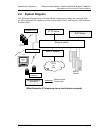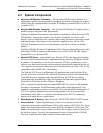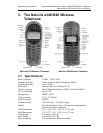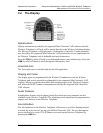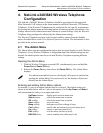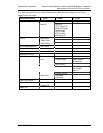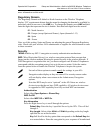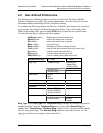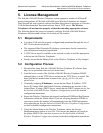
SpectraLink Corporation Setup and Administration—NetLink e340/i640 Wireless Telephone
Mitel Networks ICP and 5220 IP Phone emulation
PN: 72-1084-02-B.doc Page 15
IP Address
There are two modes in which the Wireless Telephone can operate: DHCP enabled or
Static IP. Select the mode for operation from the IP Address menu:
* Use DHCP: will use Dynamic Host Configuration Protocol to assign an IP
Address each time the Wireless Telephone is turned on. If DHCP is enabled, the
Wireless Telephone also receives all other IP Address configurations from the
DHCP server.
Static IP: allows you to manually set a fixed IP Address. If selected, the Wireless
Telephone will prompt for the IP Addresses of each configurable network
component. When entering addresses, enter the digits only, including leading
zeroes. No periods are required.
Regardless of the mode in which the Wireless Telephone is operating, the following
components must be configured:
Phone IP – the IP Address of the Wireless Telephone. This is automatically assigned if
DHCP is used. If using Static IP configuration, you must obtain a unique IP Address for
each phone from your network administrator.
SVP Server IP – the IP Address of the NetLink SVP Server. If using Static IP
configuration, this is simply the IP Address of the NetLink SVP Server. Note that the
NetLink SVP Server must be statically configured to have a permanent IP Address. If
DHCP is being used, the Wireless Telephone will try the following, in order: the DHCP
option 151, then a DNS lookup of “SLNKSVP2” if the DHCP options 6 (DNS Server)
and 15 (Domain Name) are configured.
RTC IP Addr – the IP Address of the primary Mitel Networks device. If using Static IP
configuration, this is simply the IP Address of the device. If DHCP is being used, the
Wireless Telephone will try to obtain the device’s IP Address and port information using
the following DHCP options: 129.
The following components may be configured optionally:
TFTP Server IP – the IP Address of a TFTP server on your network which holds
software images for updating the Wireless Telephones. If this feature is configured (not
set to 0.0.0.0 or 255.255.255.255) either via Static IP configuration or using DHCP
option 66 (TFTP Server), or the Boot server/next server (siaddr) field, the Wireless
Telephone will check for newer software each time it is powered on or comes back into
range of your network. This check takes only a second and ensures that all Wireless
Telephones in your network are kept up-to-date with the same version of software.
OAI Server IP – the IP Address of the SpectraLink OAI Gateway (if applicable). If using
Static IP configuration, this is simply the IP Address of the SpectraLink OAI Gateway. If
DHCP is being used, the Wireless Telephone will try the DHCP option 152.
Default Gateway and Subnet Mask – used to identify subnets, when using a complex
network which includes routers. Both of these must be configured (not set to 0.0.0.0 or
255.255.255.255) for the Wireless Telephone to contact any network components on a
different subnet. They can be set using either Static IP configuration or via DHCP
options 3 (Default Gateway) and 1 (Subnet Mask) respectively. Contact your network



